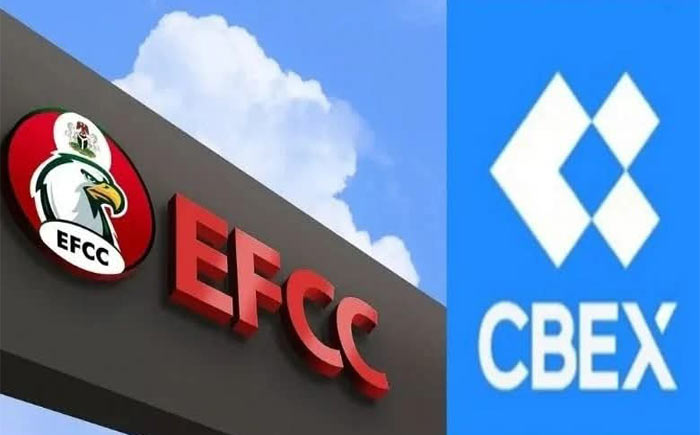
The ongoing legal proceedings involving the promoters of Crypto Bridge Exchange (CBEX) have captured significant attention, especially as the Federal High Court in Abuja granted bail to two of the detained promoters. This case is of great importance to both investors and the public at large, shedding light on the dangers of unregulated investment schemes, the role of financial institutions in maintaining transparency, and the criminal implications of fraudulent financial operations.
A Financial Scandal Crypto Bridge Exchange (CBEX) was once a booming digital platform that promised high returns to investors, drawing in billions of naira in deposits. However, the platform collapsed mysteriously, leaving investors with substantial losses. The story of CBEX unfolded as a classic example of an unregulated digital investment scheme, one that capitalized on the increasing popularity of cryptocurrency trading.
Initially, the platform appeared legitimate, offering users access to digital assets and a promising return on investment. However, things took a drastic turn when users were unable to access their investments or withdraw funds. The platform suddenly became inaccessible, triggering an outcry from the victims who had invested their savings with hopes of substantial financial gains.
The case took a critical turn in April 2025 when the Economic and Financial Crimes Commission (EFCC) sought a court order for the arrest and detention of six individuals believed to be behind the fraudulent scheme. These individuals were accused of running an unlicensed financial operation under the guise of CBEX and engaging in activities that led to the loss of investor funds.

The Legal Action and Detention of CBEX Promoters
In response to the unfolding crisis, the EFCC filed an ex parte motion before Justice Emeka Nwite on April 24, 2025, requesting the detention of six individuals suspected of fraud. These individuals included Avwerosuo Otorudo and Chukwuebuka Ehirim, two key figures who played pivotal roles in managing the platform. The EFCC's application highlighted the alarming scale of the financial crime, noting that over one billion dollars had been deposited by unsuspecting victims, only for the platform to become suddenly unavailable.
Justice Nwite granted the EFCC's request for the detention of the suspects, emphasizing the seriousness of the allegations and the need for thorough investigations to protect the public interest. Despite their detention, Otorudo and Ehirim later applied for bail, citing various reasons for their release.
On Monday, Justice Mohammed Umar of the Federal High Court in Abuja ruled in favor of granting bail to Avwerosuo Otorudo and Chukwuebuka Ehirim, two of the detained CBEX promoters. Both individuals were granted bail in the sum of N10 million each, with two sureties required for each defendant. The sureties must own property within the jurisdiction of the court, and their addresses must be verified by the court registrar.
The ruling sparked debates about the severity of the financial crimes allegedly committed by the promoters and whether they should be granted bail given the serious nature of the charges against them. However, the court's decision to grant bail under these conditions shows the importance of ensuring that accused individuals are afforded due process, even in high-profile financial fraud cases.
The core of the fraud allegations lies in the operations of CBEX, which promised investors returns of up to 100% on their investments. According to the EFCC, the defendants used another company, ST Technologies International Limited, as a front to perpetrate the fraud through CBEX.
Unrealistic Investment Promises: Investors were lured in by the promise of high returns on digital assets, sometimes reaching up to 100%. This type of offering raised red flags for many financial regulators and experts, but it attracted those looking for quick returns.
Conversion to Stablecoins: Victims were asked to convert their digital assets into USDT (Tether), a popular stablecoin, for deposit into the suspects' crypto wallets. This added an additional layer of complexity to the scheme, as it involved the use of a digital asset that was presented as "safe" due to its pegging to the US dollar.
After victims deposited funds into the platform, they were initially able to track their investments. However, the platform soon became inaccessible, and withdrawals were no longer allowed. This triggered alarm bells, as investors realized they could no longer access their capital.
Following the shutdown of the platform, victims discovered that they had been duped by the promoters. Investigations revealed that ST Technologies International Limited, though registered with the Corporate Affairs Commission, was not licensed by the Securities and Exchange Commission (SEC) to operate as an investment firm.
The total amount involved in the fraudulent scheme reportedly exceeds N1 billion, with the victims coming from various sectors, further illustrating the widespread nature of the scam.
In light of the fraudulent activities, the EFCC charged Otorudo and Ehirim under an amended three-count charge that accused them of illegal financial operations, unlicensed investment activities, and fraudulent practices. They were specifically accused of collecting public funds without the necessary regulatory approval and offering unreasonably high returns on investment.
The court proceedings were set to continue on October 13, 2025, marking a crucial date for the trial's commencement. The case is a reminder of the importance of regulatory oversight in the financial sector and the need for stricter measures to prevent fraudulent schemes that target unsuspecting investors.
This case brings into sharp focus the critical role that financial regulatory bodies such as the Securities and Exchange Commission (SEC) and the Central Bank of Nigeria (CBN) play in ensuring the integrity of the financial system. The involvement of the EFCC and the subsequent legal actions underscore the necessity of vigilance in identifying and tackling fraudulent investment schemes, especially those involving digital currencies and cryptocurrencies.
For many investors, the collapse of CBEX has served as a painful reminder of the dangers of unregulated investments. The ability of the EFCC to pursue the case diligently offers hope to those who have fallen victim to financial fraud, although it remains to be seen whether the court will deliver justice in the form of substantial penalties for the accused.
While the legal proceedings continue, investors can take important lessons from this case to safeguard their investments in the future:
Verify Investment Platforms: Always ensure that the platform you are investing in is properly registered with the relevant authorities, such as the SEC or CBN.
Avoid Unrealistic Returns: Be wary of platforms that promise returns that seem too good to be true, especially if they promise quick returns or high percentages.
Research and Due Diligence: Conduct thorough research before investing in any platform. Check reviews, testimonials, and regulatory approval before depositing funds.
Diversify Investments: To minimize risk, avoid putting all your money into one investment scheme. Diversifying can help reduce the potential for total loss if one investment fails.
The case of CBEX is not only a wake-up call for investors but also for regulators and policymakers. With the rise of digital currencies and online investment platforms, it is more critical than ever for governments and regulatory bodies to ensure that proper oversight is in place to prevent financial fraud. As the trial progresses, it will be interesting to see how the Nigerian legal system handles such cases and whether it will lead to stronger regulations in the digital finance space. This case has undoubtedly increased awareness about the importance of financial literacy and regulatory oversight, serving as a potential turning point for future cases of financial crime in Nigeria.
Lagos, Nigeria.
+234 913 161 4181
+234 803 961 8550
+234 802 321 3873
info@pepperroom.com.ng
© 2025 | 🌶️Pepper-Room - Everything Loud, Wild, and Worth Talking About. | All Rights Reserved.
Pepper-Room is not responsible for the content of external sites.